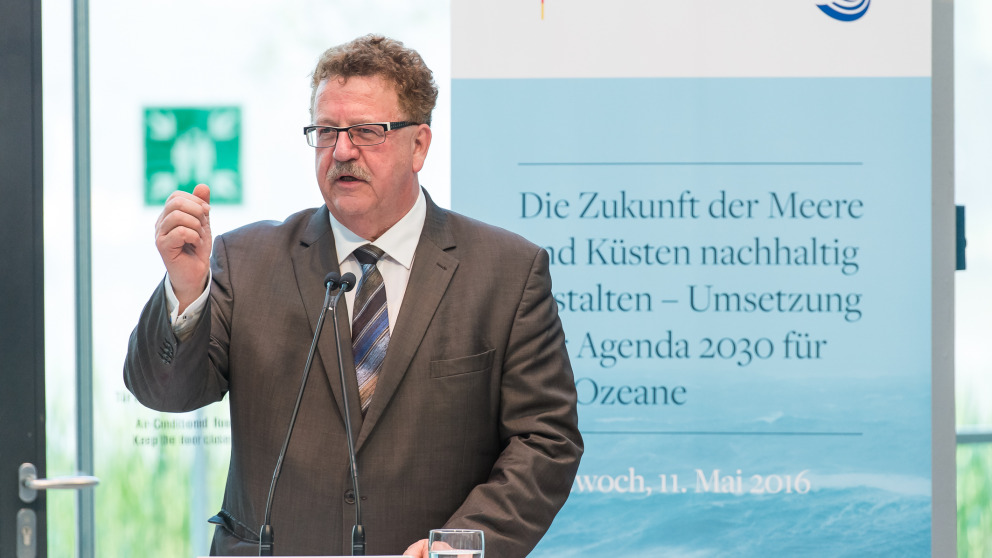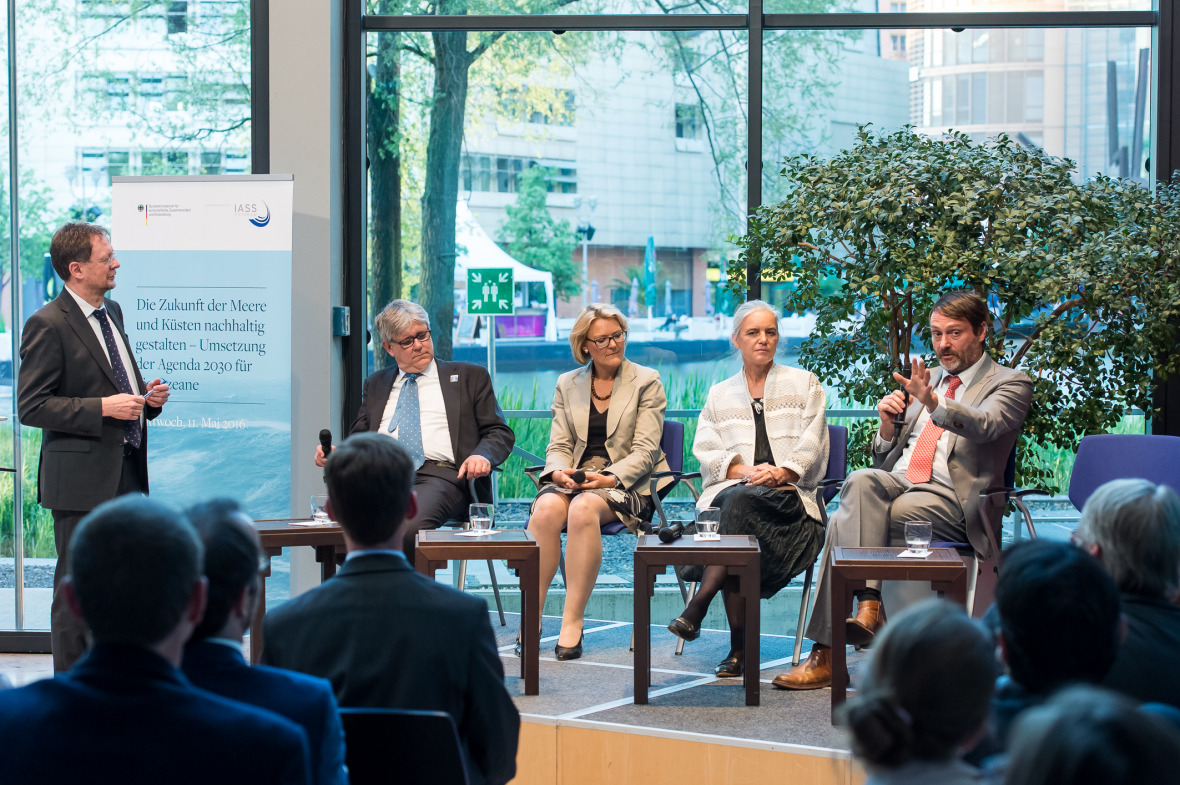Headline:
Turning Commitment into Action: Experts Highlight Options for Implementing SDGs for the Oceans and Coasts
UN Sustainable Development Goals

The protection of marine biodiversity, the sustainable use of marine resources, and the equitable distribution of revenues from fishing and resource extraction are crucial to sustainable development. In light of this, the United Nations has made “Life below water” the focus of one of its Sustainable Development Goals (SDGs). The German Federal Ministry for Economic Cooperation and Development (BMZ) and the IASS, together with their partners, invited interested parties to a Parliamentary Evening on 11 May 2016 to discuss concrete steps towards the implementation of this global agreement.
Following this, the two organisations then hosted the third Potsdam Ocean Governance Workshop on 12–13 May, in cooperation with the United Nations Environment Programme (UNEP), the Kiel-based Cluster of Excellence “The Future Ocean”, the Paris-based Institute for Sustainable Development and International Relations (IDDRI), and GIZ. Attended by over fifty international experts and representatives from governments, international organisations, research institutes and civil society organisations, the workshop focussed on innovative approaches to the implementation of SDG 14.
The future of the world’s oceans continues to rank high on the political agenda in Germany. On 18 May, Federal Minister for Economic Cooperation and Development Gerd Müller presented a 10-Point Plan for Marine Conservation and Sustainable Fishing in Kiel, which will provide support to regional implementation processes through the Partnership for Regional Ocean Governance initiated by the IASS, IDDRI and UNEP. This international initiative will support the development of new approaches to good ocean governance at the science-policy interface.
Development ministry calls for sustainable use and protection of oceans and coasts

State Secretary Hans-Joachim Fuchtel (BMZ) opened the Parliamentary Evening on 11 May by outlining Germany’s efforts to date in support of the protection of the world’s oceans. “With respect to the protection of the seas and coasts, the BMZ’s efforts are directed towards establishing and safeguarding marine protected areas and supporting sustainable fishing practices, not least of all with a view to combating hunger. At present we provide 180 million euros in funding to projects ”, he said. State Secretary Fuchtel named several examples, including the establishment of effective monitoring systems to combat illegal fishing in Mauritania and the development of a sustainable management programme for mangrove forests that dovetails with income-generating opportunities for local populations in Vietnam.
In a BMZ-funded project, the IASS, IDDRI, UNEP and GIZ are cooperating to advance the implementation of the SDGs for the seas and oceans at the regional and transnational level. Sebastian Unger, Ocean Governance Lead at the IASS, emphasised the importance of regional cooperation for marine conservation. “Oceans are not constrained by human borders. While responsibility for the SDGs is located at the national level, when it comes to our oceans and coasts, we need transnational approaches to their implementation that are not restricted to individual sectors such as fishing, shipping, or marine conservation.”
Several speakers at the workshop highlighted the need to consider the seventeen goals as a unified whole and warned against focussing efforts on the implementation of a single target. It is important that the industrialised countries lead from the front and seize on the SDGs as an opportunity to forge their own sustainable development pathways. The high degree of fragmentation in decision-making structures relating to the world’s seas make this one of the most complicated governance systems within the United Nations landscape. One possible solution to this challenge, which has been developed by the IASS in cooperation with the Paris-based IDDRI, would be to combine individual sectors and to strengthen integrated approaches to ocean governance. Regional efforts to protect the oceans play an important role within this context.
Mark Lawrence, Managing Scientific Director of the IASS, emphasised: “The oceans are integral to sustainable development. In order to find solutions to existing problems and resolve issues around ocean governance, we need to combine the best research with the best insights available from the field and from different interest groups – in other words, our response must be transdisciplinary.”
Key challenges: capacity building, regional approaches, and follow-up and review of the implementation of the SDGs
The workshop hosted by the IASS in Potsdam contributed to efforts to strengthen regional approaches and focussed on key challenges such as capacity building – in particular the development of individual, public and institutional expertise in all countries – the follow-up and review of progress towards achieving the SDGs, and the role of regional approaches to marine and coastal conservation. Participants at the workshop agreed that regional partnerships were important for the effective implementation of the Sustainable Development Goals relating to the oceans and coasts. The high-level UN Conference to Support the Implementation of SDG 14 – jointly hosted by Sweden and Fiji and to be held in Fiji on 5–9 June 2017 – could mark an important milestone. The conference could assist in the identification of potential synergies between SDGs – such as the role of oceans in ensuring food security (SDG 2) – provide support to countries pioneering the implementation of SDGs and strengthen new partnerships around, for example, the establishment of a platform for shared learning as a basis for capacity building and competence development. Participants at the workshop agreed unanimously that this process should be linked to the follow-up of the implementation of the SDGs
According to several participants, efforts to implement the SDGs would benefit from greater involvement on the part of both interest groups and civil society actors. Heike Vesper, the director of the International WWF Centre for Marine Conservation, suggested that the German Federal Government establish a national platform for ministries and associations working towards the implementation of SDG 14. Participatory processes are not enough however, argued another participant, who suggested that a radical change in thinking was required: “Why aren’t SDGs the new GDP?” Gross domestic product, the participant argued, is not a useful benchmark for measuring successful policymaking. Instead, indicators relating to sustainability would provide a better measure of a country’s long-term prosperity. Policymakers stressed their need for clear recommendations for action from the science community.
Wrapping up the workshop, workshop moderator Alexander Müller, who is a member of the Council for Sustainable Development, concluded that we must “act at the local, report at the national, coordinate at the regional, and monitor at the global level” to implement SDG 14. The science community has a key role to play in developing the operative knowledge necessary to achieving this goal. “As we implement the Sustainable Development Goals, transdisciplinary science must not only supply the necessary existing knowledge, but also become a part of the learning process and open itself to new challenges emerging within the context of the transformation towards a more sustainable society,” said Müller. The outcomes of the workshop will be reviewed with the participants and published in the form of clear recommendations for policymakers (Policy Briefs) and more extensive scientific analyses.
Seas and oceans are the focus of the Science Year 2016*17, which kicks off this June. Featuring a host of events, exhibitions and competitions, the Science Year will explore the many different aspects of our oceans, including their role as a source of sustenance, an economic space and a climate regulator.
